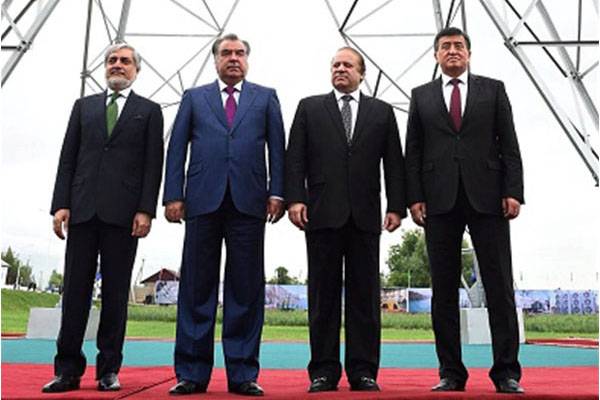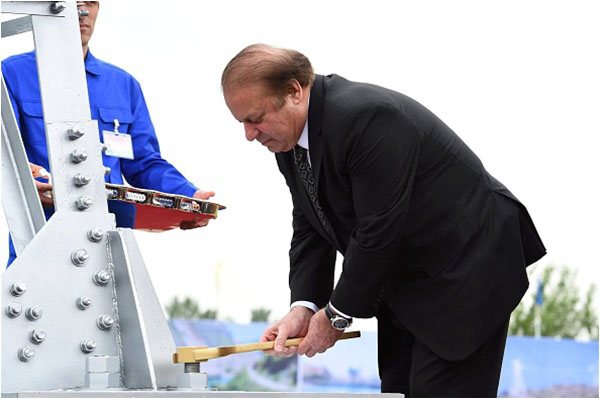
On May 12 Prime Minister Nawaz Sharif broke ground on CASA-1000, the long awaited $1 billion power project which will transfer electricity from Central Asia to Pakistan via Afghanistan. Tajikistan President Emomali Rakhmon, Kyrgyz PM Sooronbay Jeenbekov and Afghan Chief Executive Abdullah Abdullah joined the Pakistani premier in Tursunzoda, Tajikistan for the inauguration of the 1,200km, 1,300MW electricity link which is expected to be operational in 2018.
CASA-1000 will connect Kyrgyzstan and Tajikistan with Afghanistan and Pakistan, by supplying the Central Asian states’ surplus power to the energy-starved South Asian countries. According to initial agreements 1,000 MW would be consumed by Pakistan, with Afghanistan getting the remaining 300MW.
PM Sharif’s two-day visit to Tajikistan, which focused on strengthening bilateral ties in areas of trade, energy and connectivity, was his second trip to a Central Asian state in six months. In December, Nawaz Sharif had attended another groundbreaking, when he inaugurated the Turkmenistan-Afghanistan-Pakistan-India (TAPI) pipeline, in Mary, Turkmenistan. TAPI is expected to transfer 33 billion cubic metres of gas per year, and looks set to be operational in 2019.
Of the 1,200 km long CASA-1000 link, a 500-kilometre 500KV AC line will run from Datka to Khudjand, and a 750-km high voltage DC link will then connect to Kabul and eventually Peshawar. Two 1300 MW convertor stations will be constructed at Sangtuda and Peshawar, with the former converting the voltage from AC to DC, and the latter from DC to AC.

Pakistan has agreed to pay a fee of $9.35/kW during the first 15 years, which includes a $1.25/kW transit fee for Afghanistan.
While addressing the media in Tajikistan, the PM called it a ‘win-win’ for all four countries. “Everyone will be achieving a number of economic, social and environmental benefits besides reduction of energy deficit, creation of jobs and improvement in trade,” he said, adding that, “Connectivity, be it the air or rail links, is the key to regional integration, economic and trade development and people-to-people contacts.”
LCCI President Sheikh Muhammad Arshad believes CASA-1000 will go a long way in bridging the energy shortfall. “It’s not only going to help South Asia overcome the power shortfall, but it will ensure collaboration between the two regions on multiple other fronts,” he says. “The government should now focus on renewable sources and work on solar and wind energy to further overcome the shortfall and overcome the dependence on imported fuel.”
Federal Minister for Water and Power Khawaja Asif says CASA-1000 and TAPI are among the milestones that the government has achieved to fulfill its vow of overcoming the multi-pronged energy shortage. “CASA-1000 would bring a massive overhaul in the energy sector,” he claims. “Power generation was on schedule to reach thirty-one thousand MW by 2018 due to the government’s ongoing efforts.”
A Foreign Office official says this had been an integral part of Islamabad’s foreign policy in the recent past. “The pivot towards Central Asia has been on the cards since the China-Pakistan-Economic-Corridor was put to paper,” he says. “With TAPI and CASA-1000 there’s a lot to gain for Pakistan, but we’re also offering the Central Asian states access to Pakistani seaports for trade. And of course Turkmenistan, Kyrgyzstan and Tajikistan are all looking forward to connecting with CPEC.”
The official says that while Pakistan is working on strengthening relations with all Central Asian states, Tajikistan has its special place. “The Russian influence on the Central Asian states is not what it used to be a few years ago and this has helped us sign energy deals with these countries. We’re also looking into Uzbekistan and its rich gas fields. But Tajikistan has its importance beyond economic, trade and energy benefits,” he says.
“It’s virtually a bordering country, with 10 miles being the shortest gap between the two states. And there are over a million Tajiks living in Pakistan.”
The official also believed that the initiation of Tajikistan’s Somon Air flights between Dushanbe and Lahore this month would go a long way in building connections between the two Muslim countries, and ensure people-to-people contact between the two nations.
An official of the ruling party PML-N says overcoming the energy shortfall is high on Nawaz Sharif’s agenda, in turn making ties with Central Asia extremely important. “The party leaders realize that our vision for a Roshan Pakistan, and vows to curb energy shortage were instrumental in the 2013 triumph and will be extremely important in 2018 as well,” he said off the record. “The government is working on significantly improving the energy situation, if not eliminating the load-shedding altogether.”
The official says the party believes Central Asia offers better energy alternatives, which are without ‘unnecessary baggage’. “The government has focused on TAPI over the Iran-Pakistan Pipeline because the latter has been long discouraged by both the US and Saudi Arabia,” he says. “The Middle Eastern politics is too complicated as we’ve already witnessed this year. Central Asia offers better alternatives, for us to fulfill our energy goals within the next two years.”
CASA-1000 will connect Kyrgyzstan and Tajikistan with Afghanistan and Pakistan, by supplying the Central Asian states’ surplus power to the energy-starved South Asian countries. According to initial agreements 1,000 MW would be consumed by Pakistan, with Afghanistan getting the remaining 300MW.
Turkmenistan, Kyrgyzstan and Tajikistan are looking forward to connecting with CPEC
PM Sharif’s two-day visit to Tajikistan, which focused on strengthening bilateral ties in areas of trade, energy and connectivity, was his second trip to a Central Asian state in six months. In December, Nawaz Sharif had attended another groundbreaking, when he inaugurated the Turkmenistan-Afghanistan-Pakistan-India (TAPI) pipeline, in Mary, Turkmenistan. TAPI is expected to transfer 33 billion cubic metres of gas per year, and looks set to be operational in 2019.
Of the 1,200 km long CASA-1000 link, a 500-kilometre 500KV AC line will run from Datka to Khudjand, and a 750-km high voltage DC link will then connect to Kabul and eventually Peshawar. Two 1300 MW convertor stations will be constructed at Sangtuda and Peshawar, with the former converting the voltage from AC to DC, and the latter from DC to AC.

Pakistan has agreed to pay a fee of $9.35/kW during the first 15 years, which includes a $1.25/kW transit fee for Afghanistan.
While addressing the media in Tajikistan, the PM called it a ‘win-win’ for all four countries. “Everyone will be achieving a number of economic, social and environmental benefits besides reduction of energy deficit, creation of jobs and improvement in trade,” he said, adding that, “Connectivity, be it the air or rail links, is the key to regional integration, economic and trade development and people-to-people contacts.”
LCCI President Sheikh Muhammad Arshad believes CASA-1000 will go a long way in bridging the energy shortfall. “It’s not only going to help South Asia overcome the power shortfall, but it will ensure collaboration between the two regions on multiple other fronts,” he says. “The government should now focus on renewable sources and work on solar and wind energy to further overcome the shortfall and overcome the dependence on imported fuel.”
Federal Minister for Water and Power Khawaja Asif says CASA-1000 and TAPI are among the milestones that the government has achieved to fulfill its vow of overcoming the multi-pronged energy shortage. “CASA-1000 would bring a massive overhaul in the energy sector,” he claims. “Power generation was on schedule to reach thirty-one thousand MW by 2018 due to the government’s ongoing efforts.”
A Foreign Office official says this had been an integral part of Islamabad’s foreign policy in the recent past. “The pivot towards Central Asia has been on the cards since the China-Pakistan-Economic-Corridor was put to paper,” he says. “With TAPI and CASA-1000 there’s a lot to gain for Pakistan, but we’re also offering the Central Asian states access to Pakistani seaports for trade. And of course Turkmenistan, Kyrgyzstan and Tajikistan are all looking forward to connecting with CPEC.”
The official says that while Pakistan is working on strengthening relations with all Central Asian states, Tajikistan has its special place. “The Russian influence on the Central Asian states is not what it used to be a few years ago and this has helped us sign energy deals with these countries. We’re also looking into Uzbekistan and its rich gas fields. But Tajikistan has its importance beyond economic, trade and energy benefits,” he says.
“It’s virtually a bordering country, with 10 miles being the shortest gap between the two states. And there are over a million Tajiks living in Pakistan.”
The official also believed that the initiation of Tajikistan’s Somon Air flights between Dushanbe and Lahore this month would go a long way in building connections between the two Muslim countries, and ensure people-to-people contact between the two nations.
An official of the ruling party PML-N says overcoming the energy shortfall is high on Nawaz Sharif’s agenda, in turn making ties with Central Asia extremely important. “The party leaders realize that our vision for a Roshan Pakistan, and vows to curb energy shortage were instrumental in the 2013 triumph and will be extremely important in 2018 as well,” he said off the record. “The government is working on significantly improving the energy situation, if not eliminating the load-shedding altogether.”
The official says the party believes Central Asia offers better energy alternatives, which are without ‘unnecessary baggage’. “The government has focused on TAPI over the Iran-Pakistan Pipeline because the latter has been long discouraged by both the US and Saudi Arabia,” he says. “The Middle Eastern politics is too complicated as we’ve already witnessed this year. Central Asia offers better alternatives, for us to fulfill our energy goals within the next two years.”

